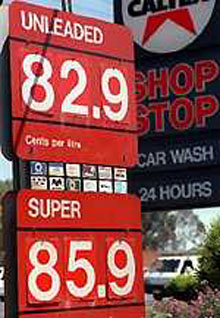 |
||
| Issue No 85 | 23 February 2001 | |
PoliticsThe Politics of PetrolBy Peter Lewis
Australia might be burning, but is it a fire that can be brought under control?
Growing resentment over petrol prices has emerged as a defining political issue in this election year. It is a dangerous political issue where self-interest and short-termism risk undermining sound policy. And for Labor, it could leave the party squeezed from both sides. The issue is, on face value, stark. In the past 12 months prices have increased by about 20 per cent. Because the government charges excise tax as a proportion of the petrol price, the government stake has been increasing as the price has continued to rise. The anger and resentment against the state is palpable - the greedy politicians are taking more of our money. A few factors add to this resentment. The first is that the one-off impact of the GST has actually led to an increase in fuel prices which has added to the excise - creating a sort of tax multiplier effect of spiraling taxes. The second is that the government bungled a legislative review of roads spending, creating the impression that it was siphoning off money. This has left a public impression of a government pushing fuel prices up by greed, with each voter paying more money every time they fill up the tank. The accepted wisdom is that petrol prices are fuelling the One Nation renaissance in rural Australia. But there is another political dynamic, every bit as dramatic as the swing to the right. That is the almost as marked swing of support towards the Greens and the very real prospect that a future Labor Government may require Green preferences. In recent years the greens agenda has expanded from wilderness issue like the Franklin dam, to a broader anti-globalisation agenda. It is light of the rise in the Greens, that the petrol pricing debate becomes even more complex. The petrol debate from a Green perspective tracks very differently. Petrol is derives from a finite resource. It is a dirty form of energy that is threatening long-term survival on this planet. It's use is increasing exponentially. As Australia attempts to flout its international obligations on greenhouse, we are witnessing a political debate around how to ensure more people can burn off more fuel for less money. Apart form being a revenue raising tax, fuel excise has always been regarded as an environmental tax. By making fossil fuels more expensive, ti is argued that more people will be tempted to use more energy-efficient forms of public transport. This of course, requires a commitment from the State to provide this sort of infrastructure, rather than merely using the money to build more roads. Looking at the issue from a global perspective, the other point to note is that Australian petrol prices are still remarkably - and in a global sense - unsustainably low. In Europe prices range from $A2 up to $A3 per litre, turning the maintenance of a motor vehicle into a real consumer choice rather than a fact of life. When the blockades in France, Britain and Italy by angry truck-drivers broke out last year the price in Europe was double what we are paying here! Add to this the fact that the Howard Government has handed out $3.5 billion in diesel and fuel rebates to people running businesses, and you see that Australia is comparatively well off. The impact of ongoing sanctions against Iraq is also an element of the equation. We are entering a phase where the OPEC nations are again in a position to squeeze Western countries for maximum price. Fears of further unrest ion the Middle East will only add to difficulties in controlling the oil-producing nations. While governments may be able to reduce prices by cutting excise in the short-term - the long-term trajectory of petrol prices is only going in one direction - up. All of which is to illustrate that petrol pricing is not just a tough issue for the Howard Government, it will force a labor Opposition to fuse its economic and environmental credentials to deal with the short-term issue without losing sight of the long-term. A bit like threading a the big guy through the eye of a needle.
|
The new Workplace Relations minister relives his own union background and explains why he�s really just another worker at heart. Honestly. Australia might be burning, but is it a fire that can be brought under control? SDA delegate Maria Kavaratzis recounts how the Campsie Big W has been transformed into a union shop. Neale Towart looks back at how popular culture has treated those workers who have not considered themselves part of the collective. The Korean Metal Workers Federation recounts a week which culminated in violent attacks on workers outside the Daewoo factory. The millennial deadline might have passed, but Jubilee 2000 is not giving up the fight for debt cancellation for the world�s fifty-two poorest countries. As Africa attempts to deal with the HIV crisis, access to the medicines that can relieve victims� suffering is emerging as a major humanitarian issue. John Howard has claimed the Liberal Party�s decimation in Western Australia and Queensland as a triumphant vindication of his party�s embracing of the national competition policy. As we ponder the One Nation renaissance, a new book challenges the current debates around xenophobia and the perceived threat of danger from Asia.
Notice Board View entire latest issue
|
|||||||||||||||||||||||||||||||||||||||||
|
© 1999-2000 Labor Council of NSW LaborNET is a resource for the labour movement provided by the Labor Council of NSW URL: http://workers.labor.net.au/85/b_tradeunion_fuel.htmlLast Modified: 15 Nov 2005 [ Privacy Statement | Disclaimer | Credits ] LaborNET is proudly created, designed and programmed by Social Change Online for the Labor Council of NSW |
|


![[Workers Online]](/images/logo_small.gif)